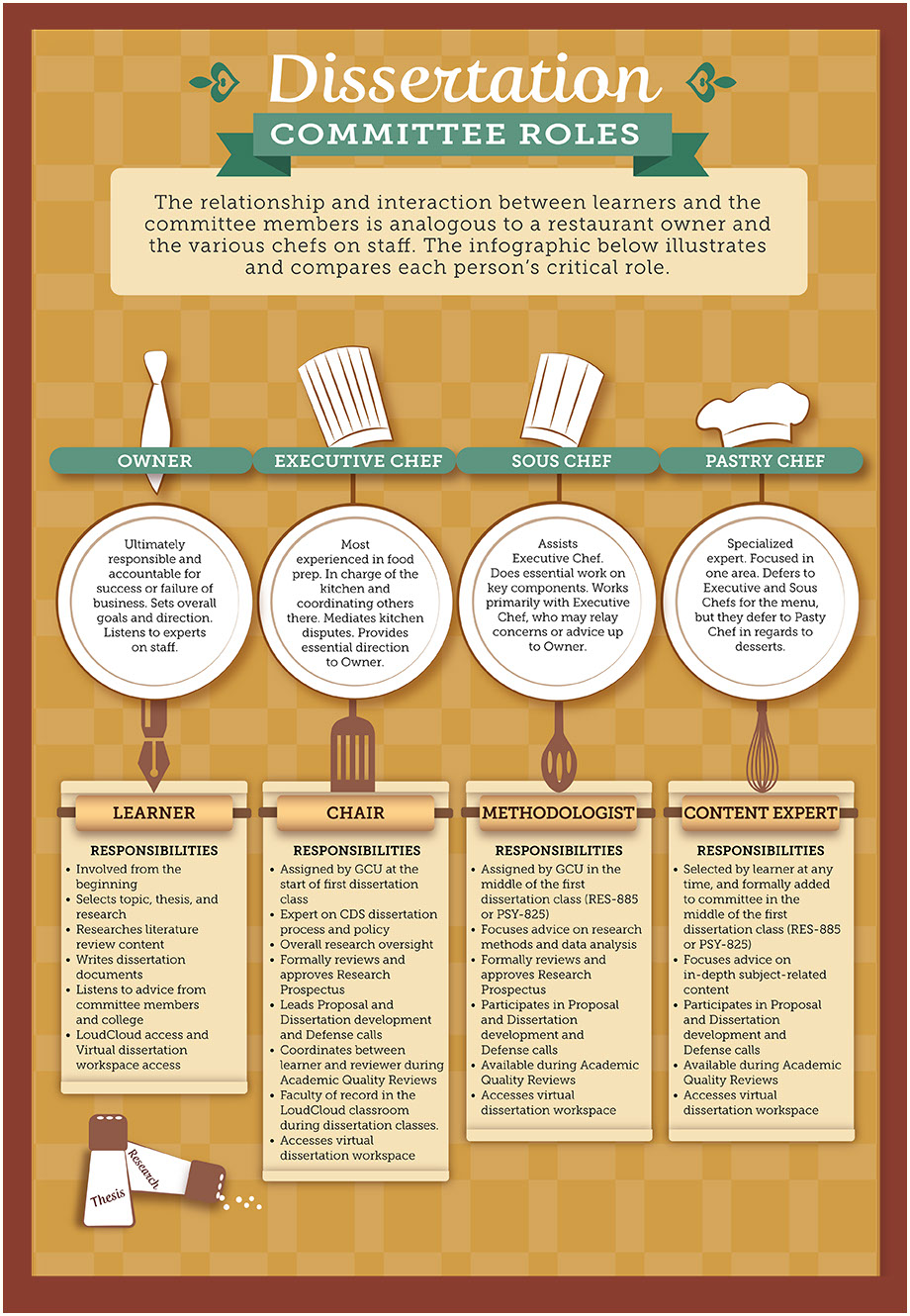Show Navigation Menu
Section Three : The Journey Ahead
Chapter 9: The Doctoral Journey
Introduction | Engaging as a Doctoral Learner | Doctoral Community Network |
The Dissertation | Conclusion | References
Hide Navigation Menu
Home Page
Section 3 The Journey Ahead / Chapter 9 The Doctoral Journey
4. The Dissertation
The dissertation is the defining element of the doctoral journey as well as one the most respected achievements in academe. New doctoral students often hold the dissertation in equal measures of fear, awe, and excitement. At GCU, the primary goal of the integrated dissertation process is to remove the fear, demystify the awe, and leave the excitement untouched. To achieve that goal, the College has broken up the intensive and often complicated work of building a dissertation into manageable pieces integrated throughout the curriculum.
Dissertation Process and Timeline
The dissertation is a lot of work. According to the National Science Foundation (2014), average students in a doctoral program in the United States take approximately seven years to complete their dissertation. The reasons for this are varied, but a common one is that in many doctoral programs the dissertation work is not started until after the course work is completed. These doctoral students do not fully begin the process of writing their dissertations until two to four years of conventional course work is completed. Writing a book of completely new scholarship and research is a major undertaking. In addition to integrating the dissertation process throughout the curriculum, the process of getting to the formulation of a research plan and design has been broken down into a series of steps and milestones that gradually builds research skills and scholarly knowledge. This gradually building, scaffolded process, in which each dissertation step builds on the content developed during the previous step, will make designing and executing the research and writing of the final dissertation manuscript much easier.
Dissertation Committee Roles
As there are many pages of original scholarship that need to be created, learners must become strong researchers and scholarly writers to be successful in the dissertation process. The jump from prospectus to proposal is quite large; however, the learner does not have to complete that step alone. The second step toward the goal of a fear- and confusion-free dissertation is the formation of a knowledgeable and helpful dissertation committee.
The dissertation committee works as a team to advise, guide, and assist the learner in the completion of a dissertation. By the time the committee is assigned in the first dissertation class, learners are building up to an initial draft of the proposal. In the College of Doctoral Studies, each dissertation committee consists of three members: a chair, a methodologist, and a content expert.
The committee will be populated with knowledgeable terminally-degreed faculty members who have experience with scholarship and publication and have been trained on the policies and steps in the College’s dissertation process. These committees are a great asset that will provide learners with essential guidance and direction, but they are not in charge of the dissertation; the dissertation is the learner's responsibility. Ultimately, the learner writes the dissertation, not the chair, not the other committee members, and not the College. So what do the committee members do, and how do learners and their various committee members interact most effectively (see Figure 9.1)?

At GCU, the primary goal of the integrated dissertation process is to remove the fear, demystify the awe, and leave the excitement untouched.
Figure 1: Dissertations Committee Roles
Dissertation Milestones
In order to help learners successfully complete their dissertations, GCU has developed a set of milestones to guide them from the start of the doctoral program to completion of the final dissertation manuscript. These milestones generally fall into two groups. The first group is embedded throughout the curriculum during the first two and a half years of the program. The second group starts when the committee is assigned during the third year and covers the many steps of writing, iterative review, and approval that take the learner and his or her committee through to the final signature on the dissertation. The milestones for the first group vary depending on the program, as the PhD, DBA, and EdD programs have different courses. This media piece provides an overview of the first group of milestones, which courses the dissertation milestones occur in, and where dissertation documents are introduced and finally submitted for each program of study.
At the end of the first group of milestones, regardless of the program, the GCU doctoral learner should have a full committee, a completed and approved Prospectus, and an initial draft of the Proposal. The second group of milestones takes place in the dissertation classes, all of which have a 900-level course designation. It does not matter in which program a learner is enrolled. All programs in the College of Doctoral Studies follow the same milestones and the same dissertation process as described in the "Dissertation LifeCycle."

